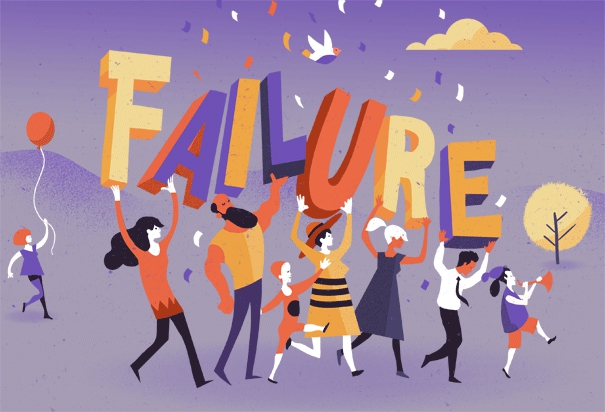
In Western culture, and especially in the U.S., we tend to associate failure with the most serious of calamities
Nazarul Islam
As the clock will strike, midnight on December 31 of this fast closing year, it will be time to make our ritual New Year Resolutions. We will start bragging about how grandly we are going to fail to keep them?
And, indeed, the accompanying feeling of relief, even secret pleasure, that we experience as we do so. In the delicious confusion of the festive season, when the old year is about to die and the new one is yet to be born, with cheek, glee, and self-irony aplenty, we let everything go. “I want to drink less or quit smoking this year.”
But who are we really trying to fool? “That’s never going to happen!” we tell ourselves with a giggle. We know only too well that in the morning, when the feast is over, we will return to our old seriousness. Only now, we play the end-of-the-year game with all the more abandon.
 Our conveniently vague or unrealistic New Year resolutions have failed because these are meant to fail. Because they are made half in jest, in an unguarded moment of carnivalesque freedom. For most of us, this may be the only time of the year when can afford to mock failure, even as we mock ourselves in the process.
Our conveniently vague or unrealistic New Year resolutions have failed because these are meant to fail. Because they are made half in jest, in an unguarded moment of carnivalesque freedom. For most of us, this may be the only time of the year when can afford to mock failure, even as we mock ourselves in the process.
Most of the time, it is failure that controls and mocks us, and we can’t even attempt a smile as it does so
The only time where we can take back control of our failings—or at least, feel like we do. Most of the time, it is failure that controls and mocks us, and we can’t even attempt a smile as it does so.
An honest truth we accept is that failure is no laughing matter. In Western culture, and especially in the U.S., we tend to associate failure with the most serious of calamities: loss of social status and respectability, public degradation, marginalization, ostracization. Since failure doesn’t like to travel alone, whenever it shows up, a sense of finality and doom also creeps in.
There is a good historical reason for that. The way we think about failure today is informed, in more than one way, by the strong Calvinist ethos that played such an important role in the birth of modern capitalism in the west. Very much like the early Calvinists, we associate financial prosperity and social success with a sense of personal salvation.
For readers in this part of globe, the Calvinist viewpoint vests in a person who has sinned was predestined to sin, and no matter what a person does, they will go to Heaven or Hell based on that determination. There is no repenting from sin since the most evil thing is the sinner’s own actions, thoughts, and words.
To make money, and to show it, is a sign of “election”—divine in Calvin’s case, social in ours. Reversely, failing to do so signals personal damnation; Calvin called such people “reprobates,” and relegated them to eternal flames. We call them “losers,” and consign them, a touch more charitably, to the margins of polite society.
Unsurprisingly, the guiding principle is the same in both cases: It’s not enough for Calvin’s elect to be saved. Others have to be doomed, too. The heat of hell makes paradise’s breeze all the more refreshing. It’s only in relation to those who lose that victors are victors— and can feel as such.
Indeed, the existence of “losers” is key to the success of capitalism as a system: it’s what keeps it in perpetual motion and everybody on their toes. Just as Calvin’s elect could never be completely certain of their salvation, and had to work on it incessantly, so too do the capitalists need to watch their back continually and make sure there is always a distance between them and their competition.
Very much like the early Calvinists, we associate financial prosperity and social success with a sense of personal salvation.
And since everybody is playing the same game—and playing it ferociously—we just cannot afford to stop. To do so would be to allow someone else to take your place and to feel like a “loser.” As the cycle goes, we end up working ourselves to death just to stay socially alive.
That’s why if there’s something that capitalism cannot do without is not necessarily the free market or private property, but a much humbler thing: ranking. Thanks to it, the players of the capitalist game know, at any given moment, where they are exactly, who is ahead and who is behind, who has made it big and who has gone under.
Also read: Failure is a catalyst for change…
We rank everything: countries and companies, universities, high schools, books, and films—even individuals. Each one of us is reduced to a set of numbers, which largely predetermines our biography: credit score, GPA scores, class rank upon graduation, the ranking of the university we went to. We are not who we think we are, but what our numbers say about us.
____________
 The Bengal-born writer Nazarul Islam is a senior educationist based in USA. He writes for Sindh Courier and the newspapers of Bangladesh, India and America. He is author of a recently published book ‘Chasing Hope’ – a compilation of his articles.
The Bengal-born writer Nazarul Islam is a senior educationist based in USA. He writes for Sindh Courier and the newspapers of Bangladesh, India and America. He is author of a recently published book ‘Chasing Hope’ – a compilation of his articles.